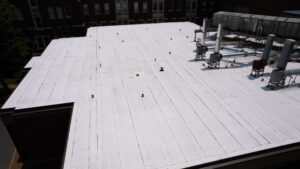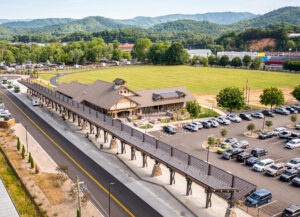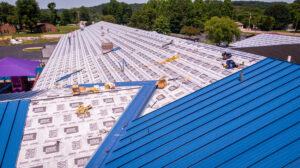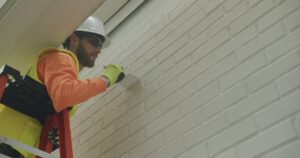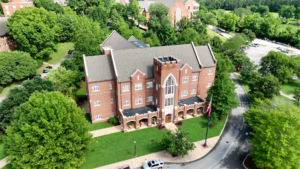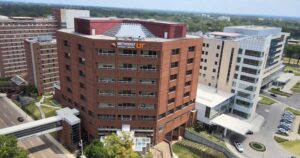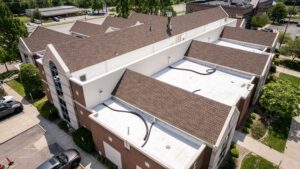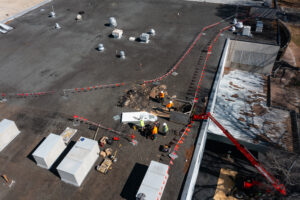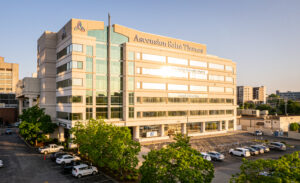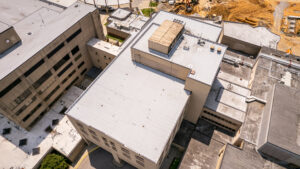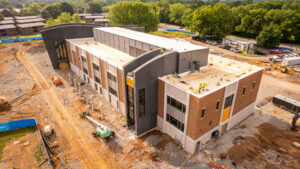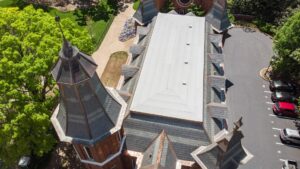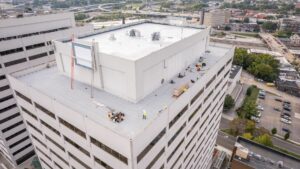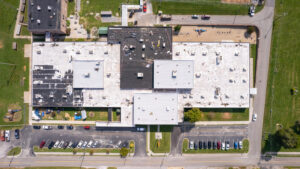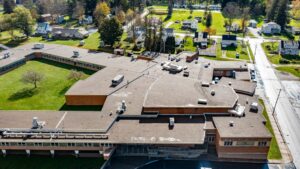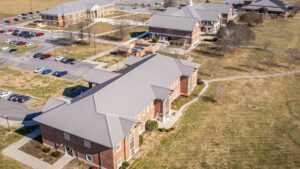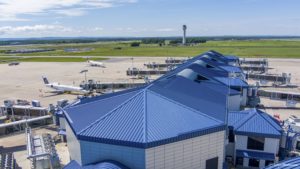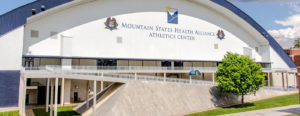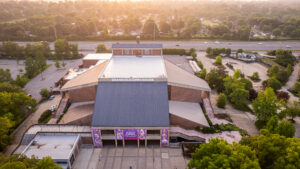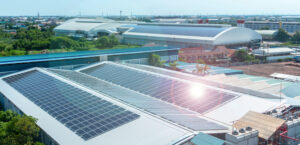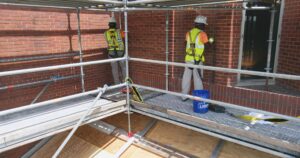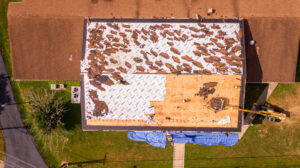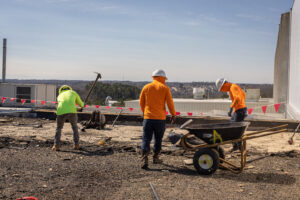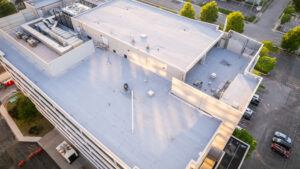In Nashville, commercial roofs withstand various environmental challenges: seasonal storms, intense sunlight, and occasional ice and snow. These elements take a toll, gradually diminishing the integrity of the roof—your business’s primary defense against the elements. However, the need for a new roof often goes unnoticed until problems arise, disrupting daily operations. Understanding when to replace your commercial roof is not about waiting for leaks to disrupt your operations. It’s about proactive management, recognizing the subtle signs of deterioration, and responding before it impacts your bottom line.
Lifespan of Commercial Roofs in Nashville
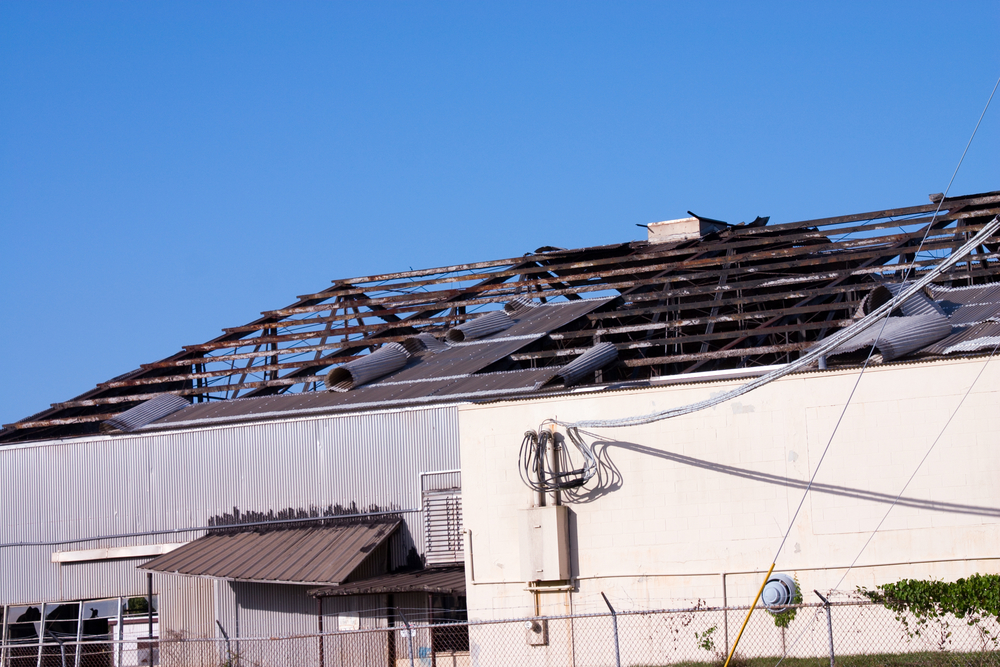
Nashville’s commercial buildings primarily feature roofing made from materials such as metal, EPDM, TPO, and built-up roofing, selected for their durability and ability to withstand the city’s diverse weather conditions. The lifespans of these materials vary, reflecting their resilience and maintenance needs.
- Metal roofs are celebrated for their durability, often lasting 40 years with proper maintenance. However, they are not immune to Nashville’s whims, with issues like thermal movement and rust being common.
- EPDM roofs, known for their resilience, can last up to 25 years. But standing water and UV radiation can accelerate aging. Check more about EPDM roofing advantages and disadvantages here.
- TPO roofing offers around 15-20 years of protection, balancing durability with affordability. Yet, seam weaknesses can be a downfall, especially when faced with Nashville’s unpredictable weather patterns.
- Built-up roofs (BUR) provide multi-layer protection for about 15-20 years but demand regular maintenance to defend against the elements, particularly during the storm season.
External factors, such as improper installation, inadequate ventilation, and neglect of regular inspections, can prematurely age these materials, emphasizing the need for ongoing roof management.
Learn more about our Built-Up Roofing maintenance services
Telltale Signs It's Time for a New Roof
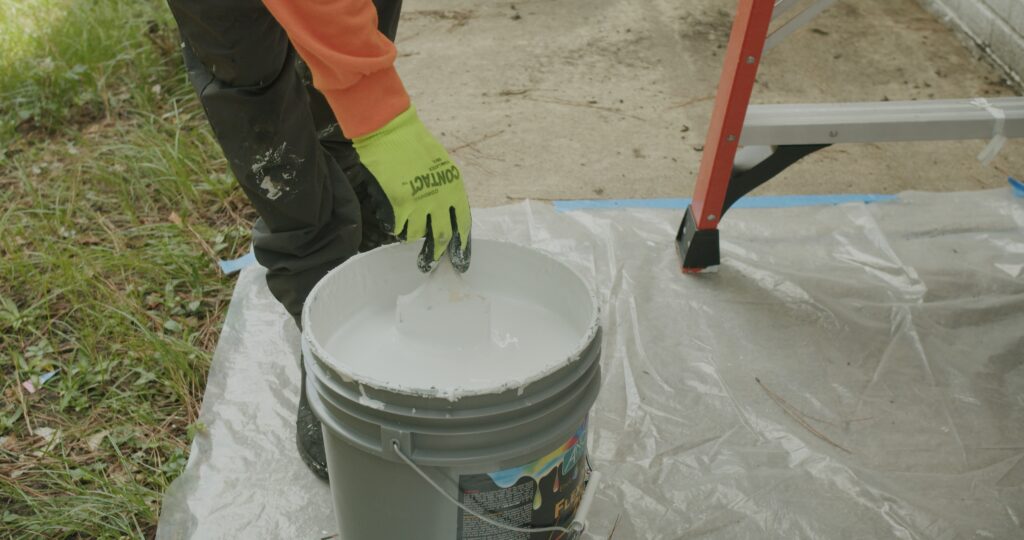
Recognizing the signs indicating the need for a new commercial roof is essential, as they go beyond the apparent leaks and water damage. Here are clear indicators that your Nashville business’s roof might require a replacement:
Frequent Repairs
If you find yourself frequently contacting roofing contractors for repairs, it’s a clear indicator of a deeper issue. Constant maintenance and minor fixes suggest that your roofing system is on its last legs, signaling an impending need for a complete replacement to prevent further disruptions and increased costs.
Age of the Roof
If your roof is hitting the 20-year mark, it’s time to give it some serious thought. Most materials wear down significantly after two decades.
Increasing Energy Bills
Noticed a sudden increase in your energy bills? Your roof might be underperforming in insulation, causing your HVAC system to work overtime.
Visible Damage or Deterioration
Keep an eye out for:
- Blisters or bubbles on the surface.
- Cracked, curled, or missing shingles.
- Signs of water damage or leaks.
- Large patches of mold or moss.
Structural Concerns
Indicators of deeper structural problems include a sagging roof deck, internal water damage, or daylight streaming through the roof, all signaling the need for immediate inspection.
Material Breakdown
If the roofing materials show signs of general degradation, such as becoming brittle, losing granules, or stripping easily, these are direct indicators of material failure.
Pooling Water
For buildings with flat roofs, accumulated water that doesn’t drain properly is a serious concern, as it can lead to structural weakening and material damage over time.
Why Nashville's Climate Calls for Your Attention?
The climate in Nashville, Tennessee, is classified as humid subtropical under the Köppen climate classification, meaning it experiences a range of weather conditions throughout the year. The city faces hot summers and mildly cold winters, with varying levels of humidity, precipitation, and cloud cover.
Here’s a more detailed breakdown:
Temperature Variations: Throughout the year, Nashville sees temperatures ranging from an average low of 30.6°F in January to an average high of 88.3°F in July. These fluctuations indicate the need for roofing materials that can withstand both extremes.
Precipitation: Rainfall is unevenly distributed throughout the year, with the highest levels in July (4.02 inches) and the lowest in November (1.77 inches). This unevenness requires roofs to be resilient against water damage and potential flooding, especially during the wetter months.
Snowfall: Snow is relatively rare and primarily occurs from November to February, with January receiving the most snowfall (0.94 inches). Though the amounts are minimal, the presence of snowfall indicates that commercial roofs must be designed to bear the weight and moisture without structural damage.
Humidity and Cloud Cover: Humidity levels fluctuate around 75% annually, peaking in the colder months. High humidity can affect building materials, so it’s essential to choose roofing that resists moisture-related damage. Additionally, cloud cover is highest in January and February, potentially impacting the effectiveness of solar panels if they are part of the roofing system.
Given these factors, it’s important for building owners in Nashville to select roofing materials that can withstand these diverse conditions. Regular maintenance and inspections are also key to ensuring longevity and performance, regardless of the weather challenges presented by the local climate.
Navigating Roof Replacement in Nashville
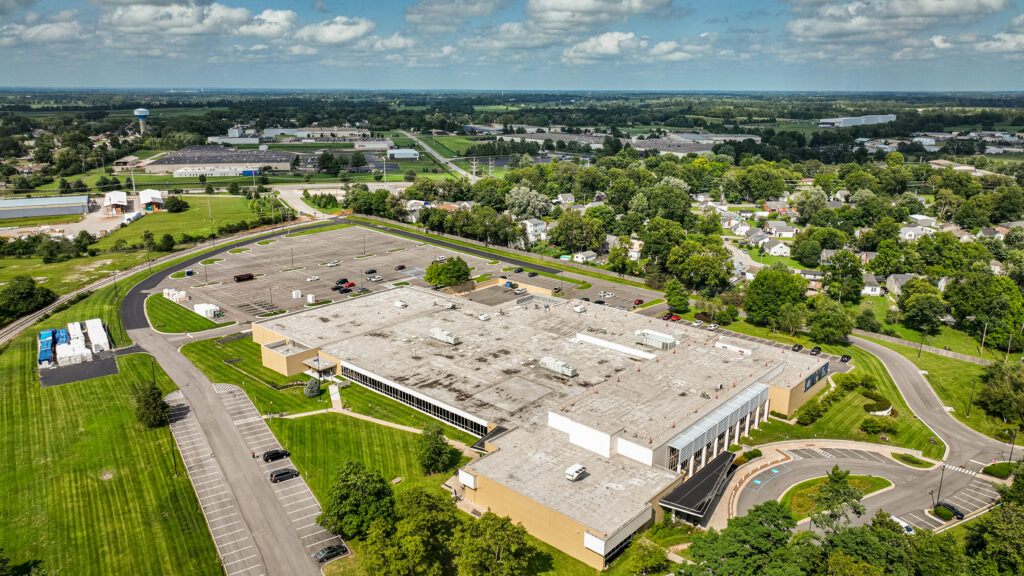
1. Assess the Situation:
Before diving in, take a moment to evaluate the current state of your roof. If you’ve been experiencing frequent leaks, visible damage, or if your roof is simply getting old, it might be time for a change.
2. Research Local Contractors:
Nashville boasts a plethora of skilled roofing contractors. Look for those with stellar reviews, a solid track record, and experience with commercial properties. Don’t shy away from asking for references!
3. Get Multiple Quotes:
It’s always a good idea to get a few estimates. This not only helps you understand the market rate but also gives you a chance to weigh your options.
4. Understand the Legal Side:
Every city has its regulations, and Nashville is no exception. Check with local authorities about necessary permits. Some contractors handle this for you, but it’s always good to be in the know.
5. Plan Around Your Business Operations:
Roof replacement can be disruptive. Coordinate with your contractor to schedule the work during off-hours or during a period when it will least affect your operations.
6. Budget Wisely:
While it might be tempting to go with the cheapest option, remember that quality matters. Factor in both immediate costs and long-term value. Consider potential energy savings, durability, and warranty when making your decision.
7. Stay Informed:
Ensure you’re kept in the loop throughout the process. A good contractor will keep you updated, but don’t hesitate to ask questions or raise concerns.
8. Post-Installation Care:
Once your new roof is in place, it’s not a ‘set it and forget it’ deal. Regular inspections and maintenance can prolong its life and ensure it continues to protect your property effectively.
Eco-Friendly and Energy-Efficient Options: Make a Smart Choice
Cost-Effectiveness in the Long Run
While the initial investment in green roofing solutions might be higher than traditional materials, the long-term savings they offer in terms of reduced energy consumption and lower maintenance costs ensure that your investment is cost-effective over time. You’re not just replacing your roof; you’re enhancing the overall operational efficiency of your business.
Enhanced Brand Image and Reputation
By replacing your old roof with eco-friendly materials, your business demonstrates a commitment to sustainability, a trait highly valued by today’s consumers, partners, and stakeholders. This step can significantly enhance your brand image, making your property more appealing to potential tenants or buyers, and possibly allowing you to command higher rents or sale prices.
Access to Incentives
Investing in energy-efficient roofing systems may qualify your business for tax rebates, incentives, and certifications, offsetting the initial costs of roof replacement. These benefits make the decision to go green even more financially attractive.
Prepared for the Future
As environmental regulations become increasingly stringent, making the switch to sustainable materials now positions your business as a forward-thinking, compliant entity. You’re not just replacing a roof; you’re preparing your business for a future where sustainability is not just preferred but required.
Contribution to a Healthier Environment
Opting for an eco-friendly roof, your business contributes to a healthier environment, which can be a source of pride for everyone associated with your company.
When the time comes to replace your roof, considering eco-friendly and energy-efficient options is a way to convert a necessary expense into a long-term investment in the future of your business and the planet. It’s a practical, forward-thinking move that redefines what it means to replace your roof.
Your commercial roof is more than just a structural necessity; it’s a business asset. Making informed, strategic decisions about its maintenance and replacement can impact operational efficiency, financial health, and even company reputation. As you consider the future of your Nashville property, remember that investing in your roof is investing in the heart and soul of your business’s longevity.
Evaluate the potential of commercial solar roofing systems to enhance your building’s efficiency and value.

